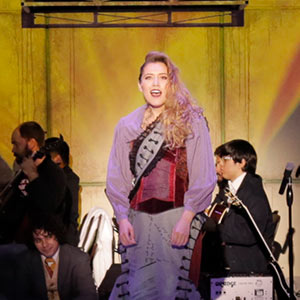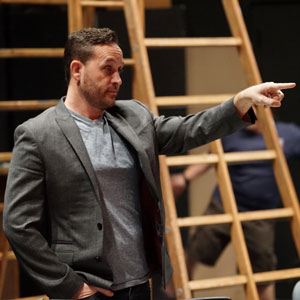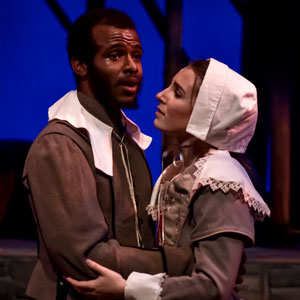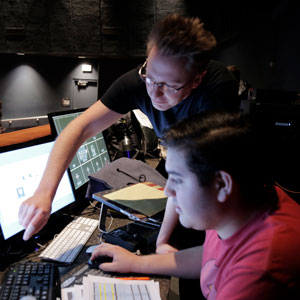Listen to the Lion
— Fullerton College Hornet - Robert Stapleton - Friday, October 25th, 1991With "Dances With Wolves" and all, it's become hip to be an Indian lover. Now don't get me wrong, sure they got the shaft a 150 years ago but of late it seems there's a surge in people - seeking to redeem their ancestral guilt.
And redemption is offered by the barrelfull in the FC Theatre Department's production of Arthur Kopit's "Indians." But rather than capitalizing on the influx of interest and educating us on Indian heritage, the play builds on the cliche we already know; that Indians are the victims of white man plundering.
The show starts with 'Buffalo Bill' Cody(Paul Hagerty) and his Wild West Show and after a brief run-in with his guilty conscience, which haunts him throughout. the proceedings, we see what all the hubbub is about. Bill is exploiting Indians in his show, turning the Native Americans into circus wonders to be gawked at.
Throw in Buffalo Bill's killing of 4,000 buffalo, add his provocation of the Russian, Duke Alexis' (Gary Reddish) Indian shooting spree, mix with the Indians' arguments for their in alienable rights before a U.S. Senate commission, and you have a bastard causing an uproar of a plot.
The problem is that the story is convoluted and the bastard is inhuman.
The idea of the play is to present Buffalo Bill as a person and his effect on Western America through a series of flashbacks.
But flashbacks have always been tricky in theatre and this play is no exception. We're constantly jumping from the past into the future, from watching Bill unflinchingly disregard the Indians to seeing him serve as the intermediary before the Senate Commission, pleading reconsideration of the one-sided deals that
the United States government forced upon the Native Americans.
Because of this, there's no fluid transformation of Bill's' character. Other than the interspersed commission hearings, he's a pure ass in the first act as he brings the Indians to their knees. In the second act, Bill charms us all with his good guy routine but we're left wondering whatever happened to the in-between the soul-bending task of erasing old goals and forming new ones.
What's missing is the fullness of his character and although Hagerty almost saves the play at the ending-he's got just the right intensity for that scene - it's too late because we've already come to know half a character.
And that's too bad because there's so many good things about this play. Rudy Martinez performance as John Grass is enthralling, he commands our attention when on stage. And don't miss Robert Shirreff's as Ned Buntline, the newspaper reporter who brings Buffalo Bill to fame. Also, a nod goes out to Steve Craig for his superb technical direction; the, backdrop is a star-filled horizon of midnight-blues and 5 a.m.-sunrise reds and the old-time billboards advertising the Wild West Show work just right.
But the show ultimately comes down because of its lack of cohesiveness. It tries to paint a picture of what the Wild West shows were like and attempts to show us how badly the Indians got screwed, but these things depend on the Buffalo Bill character and without all of him, the rest falters.








